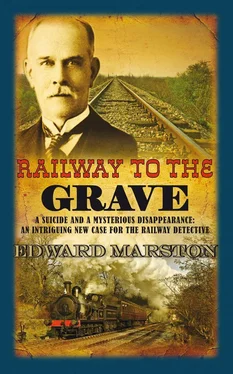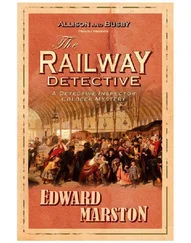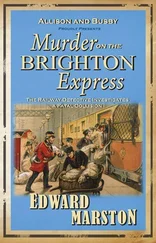Edward Marston - Railway to the Grave
Здесь есть возможность читать онлайн «Edward Marston - Railway to the Grave» весь текст электронной книги совершенно бесплатно (целиком полную версию без сокращений). В некоторых случаях можно слушать аудио, скачать через торрент в формате fb2 и присутствует краткое содержание. Жанр: Исторический детектив, на английском языке. Описание произведения, (предисловие) а так же отзывы посетителей доступны на портале библиотеки ЛибКат.
- Название:Railway to the Grave
- Автор:
- Жанр:
- Год:неизвестен
- ISBN:нет данных
- Рейтинг книги:5 / 5. Голосов: 1
-
Избранное:Добавить в избранное
- Отзывы:
-
Ваша оценка:
- 100
- 1
- 2
- 3
- 4
- 5
Railway to the Grave: краткое содержание, описание и аннотация
Предлагаем к чтению аннотацию, описание, краткое содержание или предисловие (зависит от того, что написал сам автор книги «Railway to the Grave»). Если вы не нашли необходимую информацию о книге — напишите в комментариях, мы постараемся отыскать её.
Railway to the Grave — читать онлайн бесплатно полную книгу (весь текст) целиком
Ниже представлен текст книги, разбитый по страницам. Система сохранения места последней прочитанной страницы, позволяет с удобством читать онлайн бесплатно книгу «Railway to the Grave», без необходимости каждый раз заново искать на чём Вы остановились. Поставьте закладку, и сможете в любой момент перейти на страницу, на которой закончили чтение.
Интервал:
Закладка:
The housekeeper studied her shrewdly. ‘Very well,’ she said after a lengthy pause. ‘I believe you. But that still doesn’t explain why you were held up. If someone chased you, you’d have got here faster.’
‘Those eggs were broken. I had to clean up the mess in the basket because I knew you’d shout at me if I didn’t.’
‘Go on.’
‘That’s all there is to say.’
‘No, it isn’t,’ decided Mrs Withers, taking her by the shoulders and staring into her eyes. ‘You haven’t lied to me but you haven’t told me the full truth either. There’s more, isn’t there? Out with it, Lottie,’ she urged. ‘Holding something back is the same as telling a lie.’
The girl was in a dilemma. If she mentioned that she’d seen Adam Tarleton, she ran the risk of a stern reproach. When she’d confided to the housekeeper that Tarleton had been looking at her in a way that unsettled her, Lottie had been roundly chastised and told to curb her imagination. She did not want to repeat the experience. If, on the other hand, she maintained that there was nothing left to tell, she’d be branded as a liar. Either way, there was a penalty to pay.
Mrs Withers shook her. ‘I’m waiting, Lottie.’
‘There was something,’ conceded the girl.
‘I knew it.’
‘But I didn’t do it on purpose – as God’s my witness. I just happened to be there when they rode up.’
‘Who are you talking about?’
‘I saw Mr Tarleton and his friend. I was behind some trees when I heard the sound of horses. They stopped quite close to me.’
‘Didn’t you make them aware of your presence?’
‘I was afraid to do that, Mrs Withers,’ said Lottie. ‘It was the way they laughed. I could tell they’d been drinking.’
‘That much is true,’ said the housekeeper, grudgingly. ‘I could smell it on his breath when he got back here. What happened then?’
‘They talked for a bit but I couldn’t hear a word they said. Then Mr Tarleton gave something to his friend and rode off.’
‘And that’s all?’
‘I swear it.’
‘Who was the other man?’
‘I’ve no idea, Mrs Withers. I’ve never seen him before.’
‘Can you describe him?’
‘Well,’ said Lottie, wishing that she wasn’t being held so tightly, ‘he was about the same age as Mr Tarleton, only thinner and with a pale face. He was tall, well dressed and he wore a hat with a feather in it. That’s all I can tell you except that…’
‘Go on, Lottie – spit it out.’
‘If you want the truth, I thought he was very handsome.’
Mrs Withers let go of her and turned away to reflect on what she’d just heard. Lottie was dismayed, fearing another reproof for eavesdropping. She retreated to a corner of the kitchen for safety. But there was no danger. When the housekeeper turned back to her, she was calm and pensive.
‘Yes,’ she confirmed. ‘He is handsome. I noticed that.’
Having toiled over his sermon for a couple of hours, Frederick Skelton was ready to practise it in front of his wife. She was an experienced and attentive listener, having heard hundreds of his speeches and homilies over the years. It was always a pleasure to listen to his well-honed rhetoric even if, as on this occasion, it was liberally spiced with denunciation. Dorcas was enthralled. Her husband had struck the perfect balance between praise and condemnation, hailing the virtues of a wife while criticising the actions of her husband. The sermon was long without being tedious, bold without being insensitive and shot through with a confidence that never lapsed into rodomontade. Had she not been in church, Dorcas would have clapped her hands.
It was not simply the words that Skelton liked to rehearse. The correct gestures were just as important to master. When the sermon was over, he went back to a certain passage and experimented with a different wave of his arm and a novel arrangement of his fingers. Satisfied that all was now perfect, he descended from the pulpit to receive a smile of congratulation from his wife. They returned arm in arm to the rectory, surprised to learn that Robert Colbeck was waiting for them in the drawing room.
‘I didn’t realise that you were here, Inspector,’ said Skelton. ‘My wife and I were in church.’
‘So I understand,’ said Colbeck, ‘but I didn’t think that the conversation we’re about to have would be altogether fitting for a church.’
‘May I offer you refreshment?’ asked Dorcas with practised sweetness.
‘No, thank you.’
She moved to the door. ‘In that case, I’ll leave you alone.’
‘I think you should stay, Mrs Skelton. What I have to say concerns both of you.’
‘Well, at least sit down while you’re saying it,’ said Skelton.
While Colbeck and Dorcas chose the sofa, the rector made sure that he occupied a high-backed wooden chair with elaborately carved arms. From this eminence, he looked down on the others. His air of complacency showed that he had no idea what was coming.
‘If you’ve come on behalf of the family,’ he warned, ‘then let me tell you I’m resolved on the course of action dictated to me by God. I will not have a man who committed suicide buried in my churchyard.’
‘That’s academic, sir,’ said Colbeck.
‘My husband’s word is final,’ insisted Dorcas.
‘Leave this to me, my dear,’ said Skelton before flicking his eyes back to Colbeck. ‘I’m not prepared to debate the matter, Inspector. Appeal to the archbishop, if you wish, but he knows that my ministry has been unimpeachable and will surely condone the stand that I’ve taken.’
‘I respect your right to hold that opinion,’ said Colbeck.
‘Is that all you have to say on the subject?’
‘Yes, it is – for the moment.’
Skelton rose up. ‘Then we must speed you on your way.’
‘Not so fast, sir – I’ve not finished yet. I suggest that you sit down again because this may take a little time.’ The rector lowered himself down again. ‘Regarding the cause of the suicide,’ Colbeck resumed, ‘are you aware that the colonel received several letters full of abuse and wicked accusation?’
Skelton frowned. ‘I was indeed aware of it, Inspector, and I railed against the authors of such missives from the pulpit.’
‘Will you accept that such poison-pen letters would have been extremely hurtful and put the colonel under intolerable pressure?’
‘I’ll gladly accept that, Inspector.’
‘Then the people against whom you railed should surely deserve some punishment. In my view, those who skulk behind anonymity are always despicable.’
‘I heartily agree with you.’
‘What punishment would you advise, sir?’
‘That’s for the law to decide.’
‘Did you issue no warnings from the pulpit?’
‘I said that they should be exposed and imprisoned for their crime,’ recalled Skelton. ‘I’d show them no mercy.’
‘Then we find ourselves in an awkward situation,’ said Colbeck, taking out the letter from his pocket. ‘This was the last message of hatred sent to the colonel. He died without opening it.’ He proffered the envelope. ‘Do you wish to read it, sir?’
‘Of course I don’t.’
‘Is that because you know its contents?’
Skelton frothed with outrage. ‘I find that remark both ill-mannered and insulting.’
‘What about you, Mrs Skelton?’ asked Colbeck, offering it to her. ‘Would you care to read it?’
‘No, Inspector,’ she replied, firmly, ‘I would not.’
‘You seem to be playing a silly game with us, Inspector,’ said Skelton, ‘and I must ask you to stop.’
‘Oh, it’s not a game,’ said Colbeck, pulling the card from his pocket. ‘This was sent to Agnes Reader in acknowledgement of some flowers she kindly bought for the church. I was struck by the curious similarity between the writing on the card and the letter.’
Читать дальшеИнтервал:
Закладка:
Похожие книги на «Railway to the Grave»
Представляем Вашему вниманию похожие книги на «Railway to the Grave» списком для выбора. Мы отобрали схожую по названию и смыслу литературу в надежде предоставить читателям больше вариантов отыскать новые, интересные, ещё непрочитанные произведения.
Обсуждение, отзывы о книге «Railway to the Grave» и просто собственные мнения читателей. Оставьте ваши комментарии, напишите, что Вы думаете о произведении, его смысле или главных героях. Укажите что конкретно понравилось, а что нет, и почему Вы так считаете.












